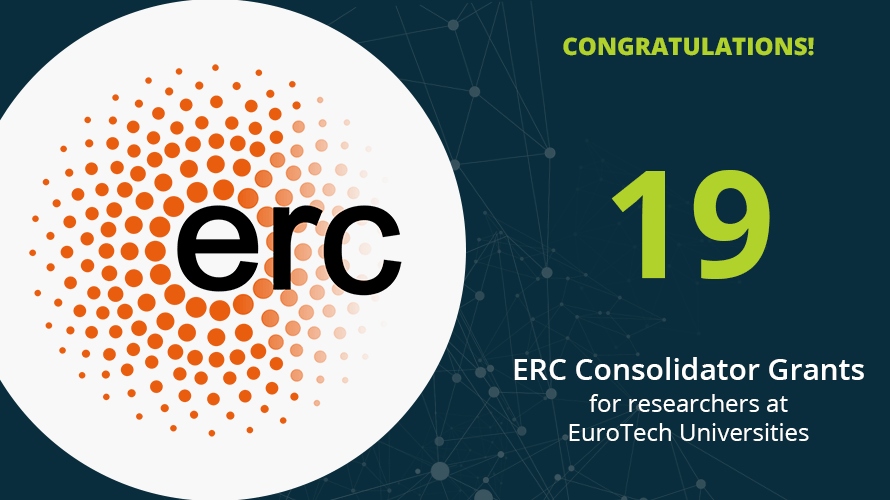22 March 2022 | Last week, the European Research Council (ERC) announced the winners of its latest ERC Consolidator Grants. 19 of the prestigious grants go to researchers affiliated with a EuroTech University. In total, the ERC awarded 313 grants with a total value of €632 million. The funding will support mid-career researchers and will help them consolidate their teams and conduct pioneering research on topics and with methods of their choosing.
However, following the termination of the exploratory talks between Switzerland and the EU last year, Switzerland is considered a non-associated third country. The negotiations failed after the ERC CoG call for proposals. As a result, host institutions established in Switzerland are now not eligible for funding; EuroTech University EPFL being one of them. The funds for the six projects won by EPFL scientists will therefore be provided by the Swiss State Secretariat for Education, Research and Innovation.
We wholeheartedly congratulate all laureates, especially:
- Floortje Alkemade, TU/e (FAST: Fostering social tipping dynamics to Accelerate Sustainability Transitions; SH7)
- Yimon Aye, EPFL (Cys-CODE: Unmasking context-specific functional protein cysteines in living systems: understanding spatiotemporal stress signaling and precision ligand-target design; LS9)
- Moran Bercovici, Technion (Fluidic Shaping: Fluidic Shaping of Optical Components on Earth and in Space; PE8)
- Jean-Philippe Brantut, EPFL (DDisQS: Driven and Dissipative Quantum Simulators; PE2)
- Raffaella Buonsanti, EPFL (TuLiP: Developing the Chemistry for Tunable Liquid Metal Nanoparticles towards Reconfigurable Materials; PE5)
- Guiseppe Carleo, EPFL (NEQS: Neural Quantum Simulation; PE2)
- Tim Dyrby, DTU (CoM-BraiN: Non-invasive Conduction Velocity Mapping in Brain Networks: A novel imaging framework for axonal fingerprinting of brain connections in health and disease; LS7)
- Johannes Graeff, EPFL (Epi-Mnemo: DNA-templated mechanisms of memory storage; LS5)
- Sonja Haustein, DTU (URGENT: Choice, necessity or chance? Understanding behaviouR chanGE iN Transport; SH7)
- Jan Kirschke, TUM (iBack-epic: Biomechanical modelling and computational imaging to identify different causes of back pain in large epidemiological studies; LS7)
- Anat Levin, Technion (SpeckleCorr: Computational imaging through scattering materials using speckle correlation; PE6)
- Gregory Nocton, L’X (PhiBond: Synthesis and Properties of F-Block Organometallics: En Route to the Φ-Bond; PE5)
- Daniela Pigosso, DTU (REBOUNDLESS: Towards the prevention of rebound effects within complex socio-technical systems; SH7)
- Nicolas Plumere, TUM (E-VOLUTION: Electrifying Peptide Synthesis for Directed Evolution of Artificial Enzymes; PE4)
- Sine Reker Hadrup, DTU (MIMIC: Molecular mimicry as a key parameter shaping T cell immunity; LS6)
- Gal Shmuel, Technion (EXCEPTIONAL: Non-Hermitian elastodynamics; PE8)
- Søren Stobbe, DTU (SPOTLIGHT: Silicon-Photonics Hot-Electron Light Sources; PE3)
- Ola Svensson, EPFL (POTCO: Polyhedral Techniques in Combinatorial Optimization; PE6)
- Eitan Yaakobi, Technion (DNAStorage: Coding for DNA Storage; PE7)






